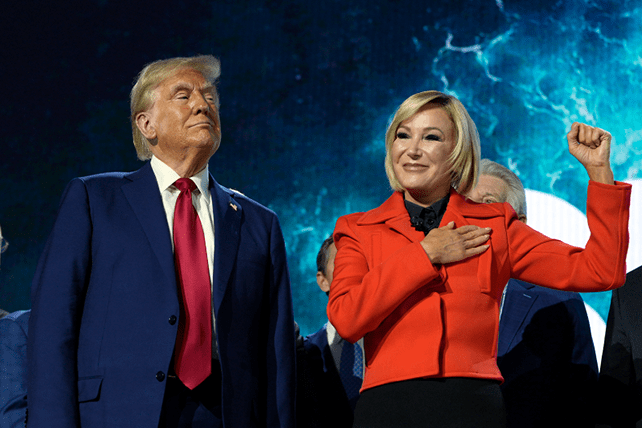(RNS) — A religious row has erupted among conservative Christians over President Donald Trump’s decision to re-appoint Paula White-Cain to run the White House Faith Office, with theological fissures erupting within Trump’s Christian coalition as leaders stake out different positions on the Florida pastor.
The debate escalated on Tuesday (Feb. 19), when Doug Wilson, an influential Reformed pastor who has emerged as an oft-cited religious thinker in conservative circles, derided White-Cain, a Pentecostal pastor, on his podcast. While responding to others on his show who were critiquing White-Cain, the Idaho pastor referred to her appointment as “a bad pick for all kinds of reasons.”
In a separate interview with Religion News Service on Thursday, Wilson said he hails from a “conservative Christian quadrant that objects to women preachers in the first place,” and described White-Cain as an “erratic woman preacher who has been all over the map.”
He went on to describe White-Cain, long regarded as Trump’s closest religious adviser, as “the kind of person that embarrassing video footage can be rolled out almost at will.”
“It’s not the greatest pick in the world,” he added.
The remarks are the latest in a back-and-forth that began shortly after Trump announced earlier this month that White-Cain would once again be heading his Faith Office, a reveal that concluded a week of faith-themed appearances featuring the president and the vice president. While White-Cain’s appointment was widely expected — she served in the same position near the tail-end of Trump’s first term — news of her return to the White House sparked blowback in some conservative Christian online spaces.
Unlike critiques from Trump and White-Cain’s numerous liberal detractors, the latest round of criticism has pitted prominent Pentecostal and charismatic Christians such as White-Cain, who have made up an important part of Trump’s evangelical Christian base, against a cadre of conservative Calvinists — including a subset influential among some of Trump’s advisers and cabinet members.
Matthew Taylor, a scholar at the Institute for Islamic, Christian and Jewish Studies who has studied the influence of charismatic Christianity on Trump, said the broader evangelical discomfort with Pentecostalism — traditions that engage in practices such as prophecies, faith healing and speaking in tongues — has been around for some time. During Trump’s first campaign and term in office, Taylor said, it was moderate evangelicals such as Russell Moore, then a Southern Baptist, who voiced their disapproval of White-Cain as well as Trump himself.
But this time the fight is more of a “sibling rivalry” between different factions of the “Christian far-right,” Taylor said, with Calvinists such as Wilson becoming power players over the past four years, alongside stridently conservative forms of Catholicism that have garnered favor with Vice President JD Vance, a Catholic convert.
“Paula White and her circle truly dominate the Trump advisory circles, the evangelical advisory circles,” he said. “Now you have these kind of natalist, radical traditionalist Catholics that see an avenue to power through JD Vance, and you see these kind of Reconstructionist Calvinist-types who see an avenue through Pete Hegseth and maybe Russ Vought. So now there’s real power and policy in play.”
Efforts to reach White-Cain for comment were unsuccessful, but the criticism quickly spurred her supporters — particularly people who, like White-Cain, operate in Pentecostal and Charismatic traditions, as well as preach a prosperity gospel, or wealth-focused, theology — to publish video testimonials in her defense.
“What was the date that it became okay, in the body of Christ, all of a sudden, to trash people by name that you’ve never met?” said Jonathan Shuttlesworth, a Pentecostal pastor of Revival Today Church, who was among the first to rush to her defense, in a video posted to X. The pastor, whose church meets in both Pittsburgh, Pennsylvania, and in Texas, is seen as ascendant among Trump’s religious advisers, posting on Friday that he was traveling to the White House to “discuss and write national policy for religious freedom.”

